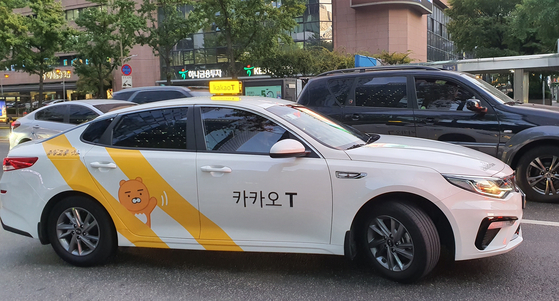
Kakao T Blue Taxi, a member taxi of Kakao Mobility, driving downtown. Reporter Park Min-je
Kakao Mobility has attracted a new investment of $200 million (219.9 billion won) from the Carlyle Group, a global investment company. It attracts attention as to whether the combination of mobility and finance can create new synergies.
Kakao Mobility announced on the 18th that the Carlyle Group participated in a paid-in capital increase of $200 million to a third party. It is a large-scale investment attraction for three and a half years since it raised 500 billion won from Texas Pacific Group (TPG) in 2017. Corporate value more than doubled from 1.6 trillion won four years ago to 3.4 trillion won. The cumulative investment attraction amount is 720 billion won. When this investment is completed, Carlisle will become the third largest shareholder after Kakao and TPG.
Keung-seon Ryu, CEO of Kakao Mobility, said, “Based on this investment, our goal is to grow to a level that can compete with global leaders in terms of technology and scale. ‘I will realize it,’ he said.
Kakao Mobility started with Kakao Taxi, a taxi calling service in 2015, and has established itself as a representative service-type mobility platform in Korea (MaaS, a service that connects all means of transportation into one) after 5 years. The surrogate driving service introduced in 2016 secured more than 90% of domestic surrogate drivers, and the affiliated taxi Kakao TBlue, which started with 100 vehicles in 2019, has grown to 16,000 units as of the end of last year. In addition, transportation that encompasses short and medium-distance transportation, such as bicycles, shuttles, intercity buses, and trains, was brought to the platform. The cumulative number of registered members of the Kakao T platform is 27.5 million.
![Kakao T bike parked in front of Pangyo Station in Seongnam, Gyeonggi Province [사진 카카오모빌리티]](https://i0.wp.com/pds.joins.com/news/component/htmlphoto_mmdata/202102/18/c6ca5b32-fb14-4dce-8a80-dd09a51104a3.jpg?w=560&ssl=1)
Kakao T bike parked in front of Pangyo Station in Seongnam, Gyeonggi Province [사진 카카오모빌리티]
Even last year, which suffered from the aftermath of the spread of the new coronavirus infection, sales increased nearly three times compared to 2019. After the revised bill of the Passenger Vehicle Act, called the so-called “Tada Ban Act,” passed the 20th National Assembly, the domestic mobility industry reorganized mainly taxis. This year, operating profit is expected to be surplus. Kim Jong-yoon, CEO of Carlyle Asia Partners, said, “Kakao Mobility has grown into the largest MaaS platform in Korea based on its data analysis and technological capabilities.”
In the industry, Carlisle’s investment is drawing attention as to whether a new service that combines finance and mobility could be released.
In fact, called Uber in Southeast Asia, Grab has grown into a super app starting from taxi calls and expanding into payment, shopping, reservation, and insurance. An official in the mobility industry explained, “Mobility companies that can secure high-quality data such as travel routes, payment information, insurance information, etc. have a great synergy effect when combined with the financial industry.”
Reporter Park Min-je [email protected]
Are you curious about the emerging companies?

If you want to open the news of the latest tech companies in three dimensions, and if you want to easily receive it by email, subscribe! ‘Article +α’ is coming. Subscribe → https://url.kr/qmvPIX

If you take a QR code, you can apply for a pack subscription.
